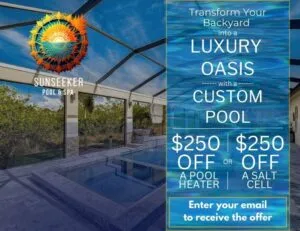Introduction
Living in Southwest Florida means enjoying plenty of sunny days and warm weather, but it also means being prepared for hurricane season. If you own a pool, taking steps to protect it from hurricane damage is crucial. Not only can hurricanes wreak havoc on your pool and equipment, but they can also lead to costly repairs and unsafe swimming conditions. This article will guide you through the essential steps to Hurricane pool preparation, ensuring your oasis remains safe and intact.
Understanding the Risks
Hurricanes can cause significant damage to pools, including structural issues, contamination, and damage to pool equipment. High winds, heavy rain, and flying debris can all impact your pool and its surroundings. Understanding these risks can help you take the necessary precautions to minimize damage.
Early Preparations
The first step in Hurricane pool preparation is your pool for a hurricane is to stay informed. Monitor weather reports and heed any warnings or advisories issued by local authorities. Having a hurricane preparedness plan in place can make a big difference. This plan should include steps for securing your pool and surrounding area, protecting your equipment, and ensuring the safety of your family.
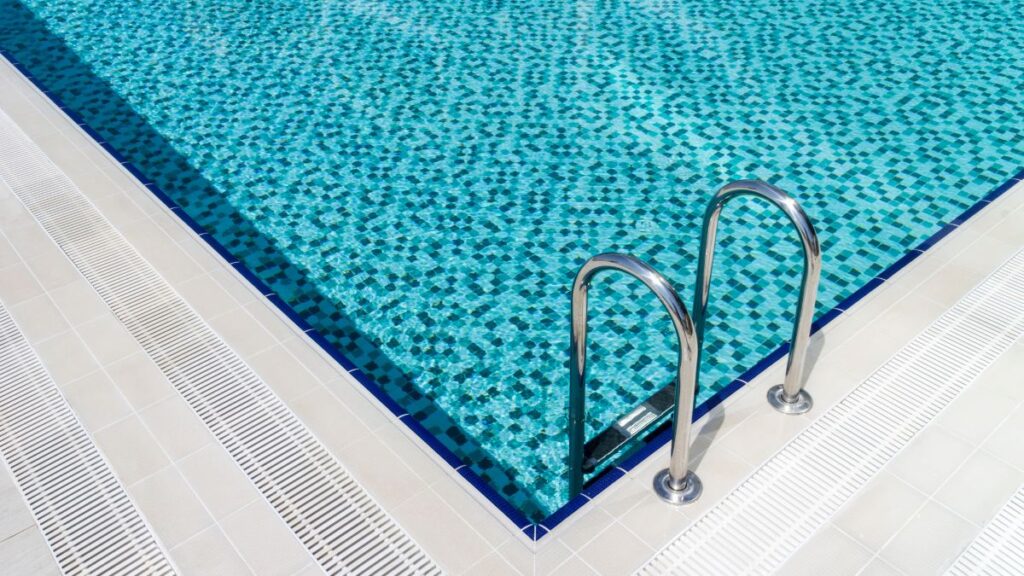
Secure Pool Area
One of the most important tasks is to remove any loose items around the pool area. Furniture, toys, and pool accessories can become dangerous projectiles during a hurricane. Store these items in a safe place, such as a garage or shed, to prevent them from causing damage.
Water Management
Adjusting the water level in your pool is another key step. While it’s a common misconception to drain the pool completely, doing so can cause structural damage. Instead, lower the water level by about one to two feet. This allows room for heavy rainfall without causing overflow. Additionally, balance your pool chemicals to prevent contamination from stormwater.
Protecting Pool Equipment
Turn off the power to all pool equipment, including pumps, filters, and heaters, to prevent electrical damage. If possible, secure these items or store them in a safe place. Covering your pool equipment with waterproof tarps can also provide added protection.
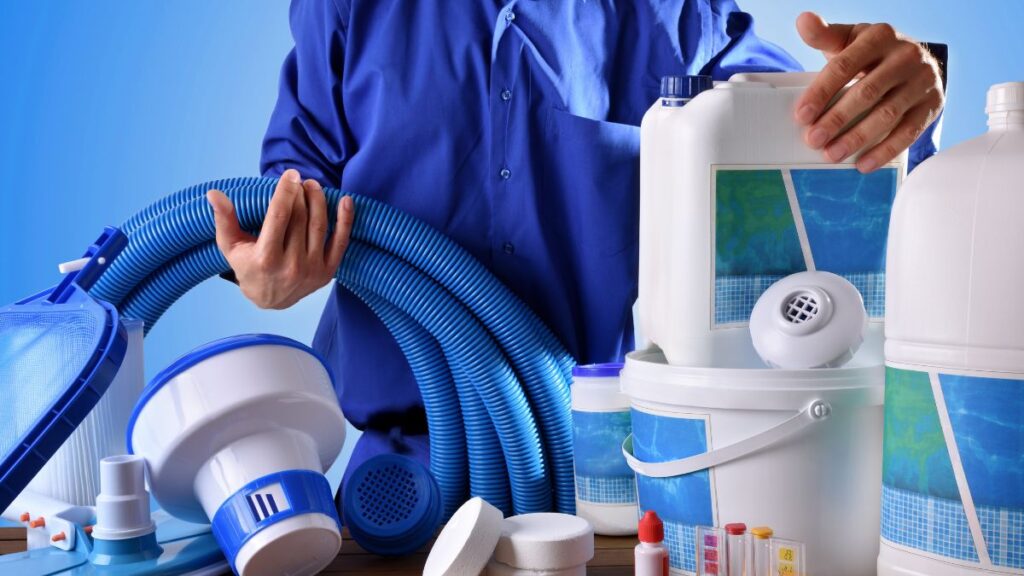
Covering the Pool
Using a pool cover can help protect your pool from debris, but it’s important to use it correctly. Secure the cover tightly to prevent it from being blown away. However, be aware that some pool covers may not withstand the force of a hurricane. Consider using a safety cover or consult with a pool professional to determine the best option for your pool.
Preventing Contamination
Shocking your pool with chlorine before the storm can help prevent contamination from debris and stormwater. Adding algaecides and other preventive chemicals can also keep your pool water clear and clean. These steps will make it easier to restore your pool after the hurricane passes.
Post-Hurricane Inspection
Once the storm has passed, it’s time to assess the damage. Check for any debris in the pool and remove it carefully. Inspect the pool structure for any cracks or damages and ensure that the water is not contaminated. Taking the time to thoroughly inspect your pool can prevent further issues down the line.
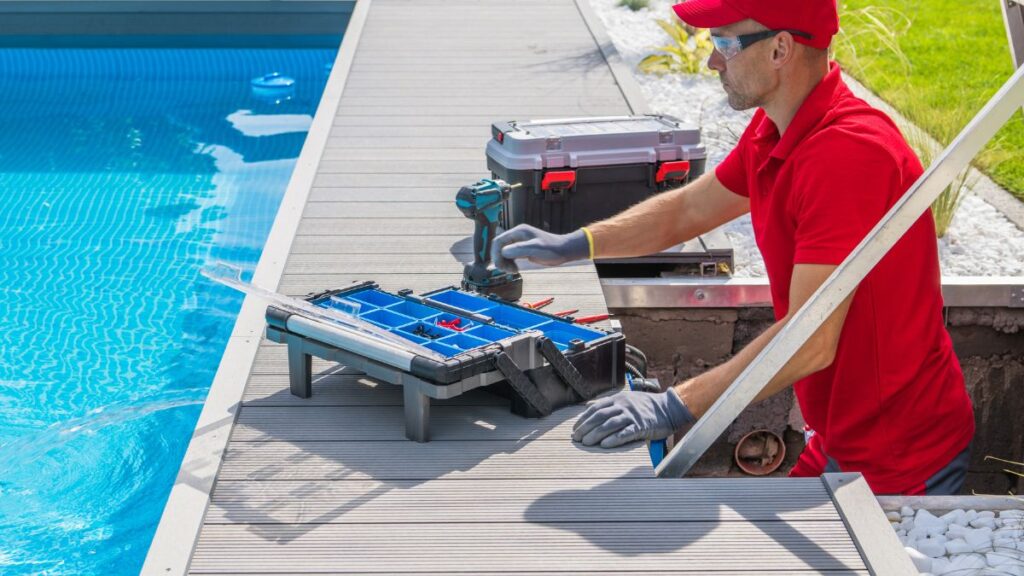
Cleaning and Repairing
Start by removing any debris from the pool using a skimmer or pool net. For larger debris, you may need to use a pool vacuum. If you notice any structural damage, such as cracks or leaks, contact a professional pool repair service. Addressing these issues promptly can prevent them from worsening.
Restoring Pool Water Quality
After removing debris and addressing any structural damage, it’s time to restore your pool water quality. Test the water for pH, chlorine, and other chemical levels, and adjust as needed. Shocking the pool again may be necessary to ensure the water is safe for swimming.
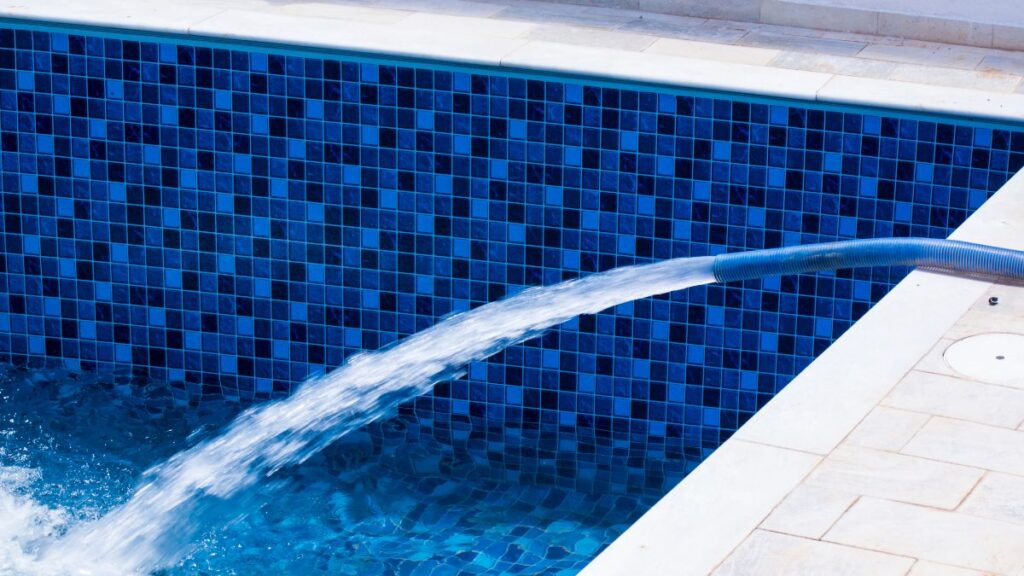
Reactivating Pool Equipment
Before turning on your pool equipment, inspect it for any signs of damage. Ensure that all electrical connections are dry and secure. Once everything checks out, you can restart your pumps, filters, and heaters. Monitor the equipment closely for the first few days to ensure it’s functioning properly.
Long-Term Maintenance
Regular pool maintenance is key to keeping your pool in top condition, especially in hurricane-prone areas. Schedule regular inspections and cleanings, and stay on top of any necessary repairs. Being proactive about maintenance can save you time and money in the long run.
Conclusion
Hurricane Pool preparation is essential to protect your investment and ensure the safety of your family. By following these steps, you can minimize damage and make the cleanup process easier. Remember, being proactive is the key to hurricane preparedness. Stay informed, have a plan, and take action to secure your pool and equipment.
FAQs
What should I do with my pool cover during a hurricane? Secure it tightly to prevent it from being blown away. Consider using a safety cover for added protection.
Can I leave my pool uncovered during a hurricane? It’s generally not recommended. An uncovered pool is more susceptible to debris and contamination.
How do I know if my pool equipment is damaged after a hurricane? Inspect for any visible signs of damage and test the equipment. If unsure, consult a professional for a thorough inspection.
Is it safe to swim in my pool after a hurricane? Only after testing and rebalancing the water chemistry to ensure it’s safe. Remove all debris and inspect the pool thoroughly.
———————————
Sunseeker Pool and Spa best inground pool construction company is your go-to destination for exceptional pool and spa construction, renovation, and repair services in Southwest Florida. Our experienced pool builders specialize in creating stunning aquatic retreats that perfectly complement your lifestyle. Serving Port Charlotte, Gulf Cove, Englewood, Venice, Rotonda West, and surrounding areas in Florida. Our dedicated team ensures that your vision becomes a reality. Whether you desire a new pool, want to upgrade your current one, or need expert repairs, Sunseeker Pool and Spa best inground pool constructor has you covered. Dive into luxury and relaxation by contacting us today to schedule a consultation!
Connect with us on Facebook for the latest updates and news.
Join our Instagram community for visual inspiration and behind-the-scenes moments.
For any queries, Contact us!












